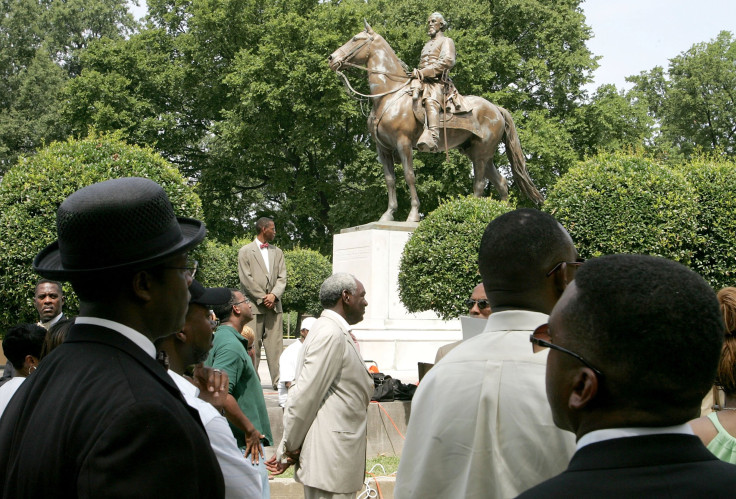Memphis City Council Removes Confederate Statues From Two Parks

The city council of Memphis, Tennessee, after a meeting Wednesday sold two public parks to a private company and started the removal of two Confederate statues in a big overnight operation the same day.
The council approved the sale of the parks unanimously to a non-profit organization, Memphis Greenspace, Inc., reported WTVT, a Fox-affiliated television station.
According to a report in USA Today, immediately after the voting, police personnel were deployed to the statues of Confederate Gen. Nathan Bedford Forrest in Health Sciences Park and of President Jefferson Davis in Fourth Bluff Park.
Memphis Mayor Jim Strickland signed the ordinance to sell the parks and took to Twitter to announce the decision.
Health Sciences Park and Memphis Park have been sold. Operations on those sites tonight are being conducted by a private entity and are compliant with state law. We will have further updates later tonight.
— Mayor Jim Strickland (@MayorMemphis) December 21, 2017
Moments ago, I signed the ordinance that completed our sale of the parks. pic.twitter.com/LZH00Pa6cv
— Mayor Jim Strickland (@MayorMemphis) December 21, 2017
Cranes were spotted near the statue of Forrest around 6 p.m. UTC but none at the statue of Davis. City of Memphis tweeted residents should expect delays and detours on streets near Health Sciences Park, where the Forrest statue is situated.
TRAFFIC ALERT: Expect delays and detours on streets adjacent to Health Sciences Park (Union/Manassas/Madison/Dunlap) and Memphis Park (on Front) tonight.
— City of Memphis (@CityOfMemphis) December 20, 2017
According to Tri-State Defender journalist Montee Lopez, crews were working towards removing the statue of Forrest after which they will remove the statue of Davis.
HAPPENING NOW - Crews working to remove statue of Nathan Bedford Forrest from Health Sciences Park, next up, Jefferson Davis…#TakeEmDown901 @TSDMemphis @LocalMemphis
— MONT (@MediaGuyMont) December 21, 2017
James G. Patterson, Tennessee Division Commander of The Sons of Confederate Veterans (SCV), an association of male descendants of Confederate veterans, released a statement after the decision of the council, WTVT reported.
The statement said: "At the Memphis city council meeting tonight, the city voted to remove the Forrest statue and Jefferson Davis statue immediately. At this moment, the parks are surrounded by Memphis City police and cranes are on site, the statues will be moved tonight. They are willfully violating the Heritage Preservation act; the City has broken state law. This has been a well-organized, behind the scenes plan by the city. They deliberately did this after hours to prevent action on our part. State officials have been contacted and will address this immediately. All of the SCV leadership from National, Army, Division and Brigades are working on this matter. My advice to each of you is to stay away from Memphis; I would say that the Memphis police will not tolerate any action around these statues."
According to the USA Today report, Mayor Jim Strickland had long said he would consider "legal" options for removing the statues, but didn’t mention immediate removal as an option. The vote Wednesday came after months of work done by the city officials who were fighting against the state’s red tapes that resulted in the statues being kept despite a wave of public opposition. Council member Edmund Ford Jr. proposed a substitute ordinance that was approved without being read before or after the voting.
The statue of Forrest, installed in 1904, was at the center of a lot of controversy for a very long time. Forrest, during the latter stages of his life, helped Memphis become one of the leading cities in the shipping industry. He was also a pre-war slave trader, an alleged war criminal and the first Grand Wizard of the Ku Klux Klan.
© Copyright IBTimes 2024. All rights reserved.












